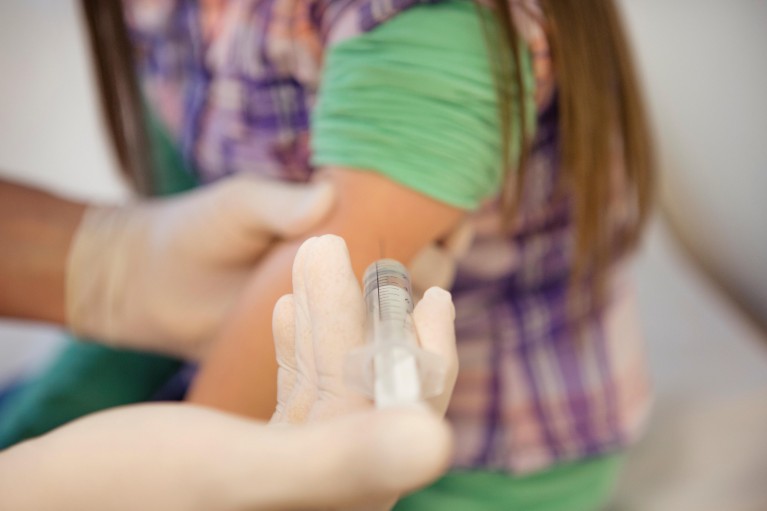Credit: Elva Etienne/Alamy Stock Photo.
Anyone who has seen discussions about vaccines on social media knows how polarized are the views between pro-vaxxers and anti-vaxxers. But an Italian study, based on data from the US, suggests that online parenting forums are a better place than Facebook and Twitter for studying and addressing vaccine hesitancy, because opposition is less vehement and users are more likely to trust each other.
The study, published in PLoS Computational Biology1 by scientists at the ISI Foundation in Turin, looked at conversations about children’s vaccinations on BabyCenter US, a popular parenting forum. The researchers analysed nearly 1.2 million posts and comments containing the word ‘vaccine’ written by nearly 200,000 users between 2008 and 2019.
As a first step, they designed a Natural Language Processing pipeline, an algorithm that analyses syntactic patterns around keywords to infer the meaning of sentences, and used it to identify users who follow the recommended vaccination schedule, and those who do not. To do this, they filtered comments related to vaccination behaviour looking for specific patterns around the keyword ‘schedule’ and assigned them to the category ‘recommended’ or ‘alternative’. Among the nearly 17,000 users who wrote about their behaviour, 60% followed an alternative schedule. “To evaluate the system’s accuracy, we manually labelled 300 randomly selected comments among the filtered ones,” explains Lorenzo Betti, first author of the study. “We found that 90% of the comments were actually schedule-related. The agreement between the labels assigned manually and those generated by the algorithm was of 86% for comments in the ‘recommended’ category and 96% for those in the ‘alternative’ one” he adds.
The authors also studied the association between vaccination behaviour and experiences of adverse events. Hesitant parents are twice more likely to report negative experiences than those following the recommended schedule, three times more likely to report second-hand experiences, and two to three times more likely to report severe symptoms, such as seizure and developmental regression.
A network analysis of the interactions between the two groups of parents showed that there is no echo chamber effect. “The conversations we analysed are less political than on social media, Twitter in particular,” says Yelena Mejova, one of the authors. “Users here listen to each other, share experiences, and ask for advice. The main message is that to encourage vaccinations, parents should be given the opportunity to talk about their doubts and concerns,” she adds.
The study also found that the websites of institutions such as the CDC, the NCBI and the FDA are among the sources most frequently shared by both vaccine-hesitant and compliant parents. According to co-author, Daniela Paolotti, this shows that clearer communication of scientific results on institutional websites could be effective in addressing hesitancy.
US survey data showed that in 2014 only 63% of children between the age of 19 and 35 months followed the vaccination schedule recommended by public health authorities. In Italy about 15% of parents hesitate to vaccinate their children. In 2019, following a decrease of the measles-mumps-rubella vaccine’s coverage and a 30% rise in measles cases worldwide, the World Health Organization declared vaccine hesitancy one of the 10 biggest threats to global health.
“The choice of the BabyCenter platform is an excellent one to gain insights into the motivations of vaccine hesitant parents”, says Munmun De Choudhury, a computational social scientist at the Georgia Institute of Technology, who was not involved in the study. This information, she adds, can be used by paediatricians “to correct misconceptions about side effects and share medically valid information that can rebuild trust in the vaccines”.
